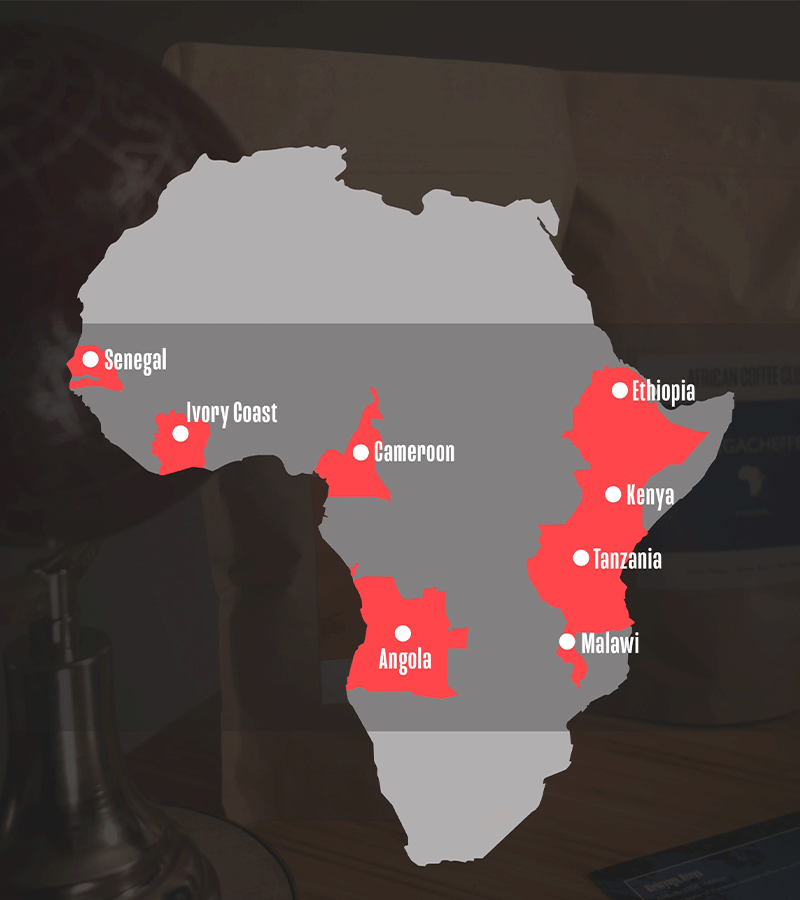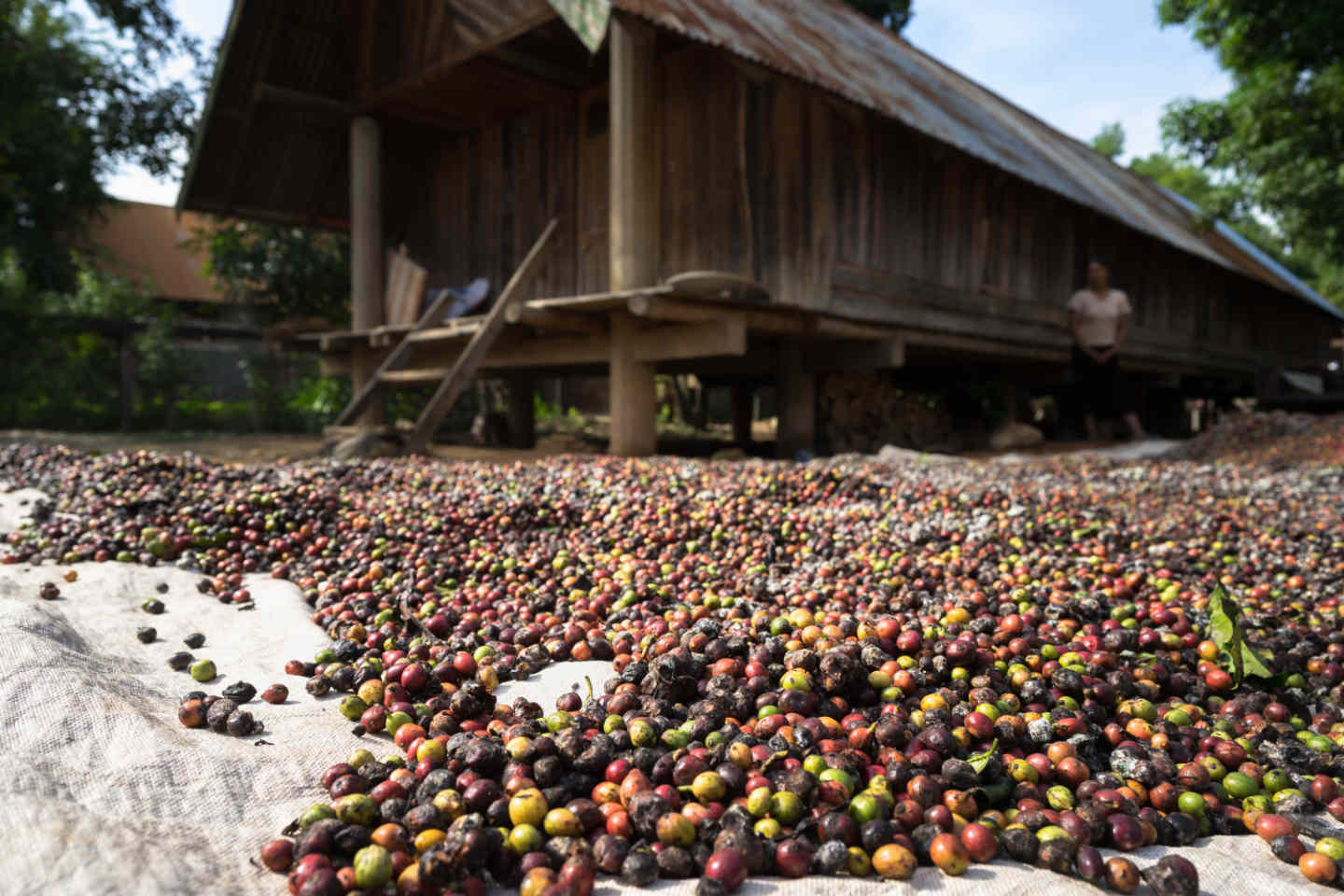African coffee is brewed around the world and is in high demand due to its richness, unique flavor notes, and the skilled farmers who tend to the crop. Here are 10 highly rated African coffees you probably did not know about.
1. Tanzanian Peaberry Coffee
Regarded for its medium roast flavor that emits an aroma with floral notes that are accompanied by hints of citrus, pineapple, and coconut taste. The aroma of a Tanzania coffee may exhibit a rustic note and sometimes a brown bread sweetness. The aftertaste lingers with a slight suggestion of East African wildness.
The acidity levels of Tanzania coffee are slightly muted compared to Kenyan coffee, are also less consistent with a milder body. Although the fruit and acidity are more understated they still shine brightly. Ground, dry Tanzania coffee may present a sweet molasses fragrance that is slightly floral with notes of apple fruit.
Mbinga is sourced from family-owned farms organized around Soochak Bush and Tropex, two companies that began collaborating in 1999 to improve coffee production in the Mbinga district of Tanzania. The Mbinga district is located in the southwestern corner of the Ruvuma region and shares a border with Mozambique and Lake Nyasa (also called Lake Malawi), one of the African Great Lakes known for its rich diversity of wildlife. Soochak Bush and Tropex provide critical support to the small producers, including the operation of a dry mill and logistics to transport and export coffee from the port city of Dar es Salaam, which is more than 1000 kilometers from the Mbinga district. To ensure improved post-harvest processing, Sobchak Bush and Tropex have rehabilitated 8 existing wet mills, built 13 new centralized wet mills, and another 8 micro-wet mills. Cherries are hand sorted, soaked so floaters can be removed, de-pulped, fermented for 2 to 3 days, washed in channels, dried on raised beds, and then sorted again at the dry mill. Farmers are paid for parchment during the harvest and paid a share of profits after export.
2. Ethiopian Harrar Coffee
Grown at up to 6,300 feet above sea level and dry processed, which helps bring out the floral notes. Some of its flavors also hint at a jasmine note. Heavy-bodied, spicy and fragrant, Ethiopian Harrar coffee is a wild and exotic dry processed (natural) Arabica coffee that is grown on small farms in the Oromia region (formerly Harrar) in southern Ethiopia at elevations between 1,400 meters and 2,000 meters. The province of Harrar, is east of Addis Ababa, the country’s capital.
Ethiopian Harrar coffee is generally highly rated and known for its winey and fruity, floral-toned acidity – bright in the cup, even intense – and tasting notes describe it with a rich and pungent, heady aroma that is wonderfully reminiscent of blackberries.
A good Harrar is bold and edgy with complexity and spice tones that may include cinnamon, cardamom, blueberry jam, apricots, compote, even smoke, and with a lingering finish.
3. Kenya AA Coffee
Grown at high altitudes. The AA has complex levels of acidity, yet maintains light flavors that embody a rich taste and aroma. Year after year, Kirinyaga coffee has earned top ranking from Coffee Review, an online publication that analyses the quality of beans globally.
Coffee grown in Kirinyaga is well known for ripe, fruit-forward profiles. Add to this one of coffee's best accidents—the diminutive peaberry—and you have a resounding cup. Many believe that the naturally occurring peaberry—where the coffee cherry produces one plump, round bean instead of two halves—doubles the flavor and sugar of the seed and is easier to roast.
Whether it’s the fine soil, the high elevation, or the influence of the otherworldly peaberry—this coffee sparkles. Imagine verdant kiwi, with its star-like glitter of black seeds, crossed with the tropical notes of lemongrass.
4. Uganda’s Good African Coffee
Good African Coffee is home-grown and contains sweet, citrus flavors. A well-brewed cup of Rwenzori coffee exhibits cupping notes similar to the desirably winey acidity of a fine East African coffee, with sweet chocolate flavor and rich texture. Generally speaking, the lower complexity and lighter body of Ugandan coffees make them generally less fruity than the coffees of neighboring Zimbabwe, Tanzania, or Kenya.
The Robustas from the Lake Victoria basin are well suited to the clay-rich soils and benefit from some high elevations in the region. They’re able to develop higher acidity than lower-altitude grown Robustas, making them a decent cup.
5. Burundi Kanyanza Coffee
Coffee lovers cherish the flavors of lemon and hints of spiced clove in the Kirimiro beans. There is also a hit of sweet nuts! Burundian coffee tends to be sweet with bright acidity, big body, and citrus, blueberry, and wild notes. High-quality, high-altitude Burundi coffees have fruits, flowers, and honey notes with consistency, balance, and body.
The sweet and clean flavor along with other characteristics of Burundi coffee has often led to comparisons with the coffees of neighboring Rwanda, particularly in the northern region of Kayanza, where it neighbors on the Rwandan border.
6. Ethiopian Yirgacheffe Coffee
The Yirgachaffe is grown at heights ranging up to 6,600 feet above sea level. It has a spicy flavor and is complemented by a tinge of sweetness. Ethiopian Yirgacheffe coffee beans are known for their sweet flavor and aroma with the right balance of body and acidity. Yirgacheffe beans also carry a spicy note and fragrance and are frequently rated as some of the highest quality Arabica coffees in the world. You will also experience the blueberry note which is unknown to any other coffee in the world.
The premium reputation of Yirgacheffe also means that it carries a premium price, but on the flip side, you will get an excellent value for your money.
Coffee lovers agree that the aroma and flavor of Yirgacheffe are unmistakable.
7. Madagascar Excellence Roasted Coffee
The coffee is available in different flavors including light roast, city roast, and medium-dark roast. When freshly roasted, it captures an aroma that compels coffee lovers to keep going for more.
8. Cameroon Arabica Coffee
Grown in the outskirts of Younde and contains a rich, spicy, mellow flavor that is accompanied by a pleasant aroma. After the coffee cherry has been harvested by handpicking and then de-pulped, the coffee berry pulp is mixed with the soil around the coffee plants in order to supplement the soil nutrients.
As Cameroon continues to improve its cultivation and processing methods an increasing amount of some of the best Arabica coffee is coming from the region which is most known for such coffees as Kenya, Tanzania, and Ethiopian Coffee.
9. Côte d’Ivoire – Ivory Coast’s Coffee Beans
The beans from Ivory Coast are regarded for being bitter and coarse, yet so flavorful. French colonizers are credited with bringing coffee into Ivory Coast in the 19th century. In World War II, coffee production increased from 36,000 tonnes in 1945 to 112,500 tonnes in 1958. After its independence in 1960, coffee production peaked in the 1970s when it became the 3rd largest producer. Coffee is the second-largest export product of the Ivory Coast. The global ranking for the production of coffee is an unimpressive 12th rank.
10. DRC’s Virunga Beans
Umoja coffee thrives to fruition in the Congolese forested highlands ~ elevation ranging from 1,480-2,000 meters. The cooperative with whom we work consists of 11,600 members, mostly small farmers, men, and women for whom coffee is vital and often the sole source of income and stability.
The fresh arrival from which your order ascends supports 1,050 specialty farmers and 600 cooperative leaders. Our fully-integrated coffee business is enabling multiple stakeholders to help improve the living conditions of its members, providing schooling, housing, jobs, and reducing coffee smuggling on Lake Kivu, while promoting women’s pygmy rights.
Twende farmers produce fully washed coffee certified Organic and Fair Trade. This cooperative consists of 2,093 members. The name Twende is representative of the commitment to continuously improving the quality of Congolese coffee and introducing it to forward-thinking partners globally. In addition to the farmers who produce Twende, 150 additional jobs are created to support operations at the washing station.


















